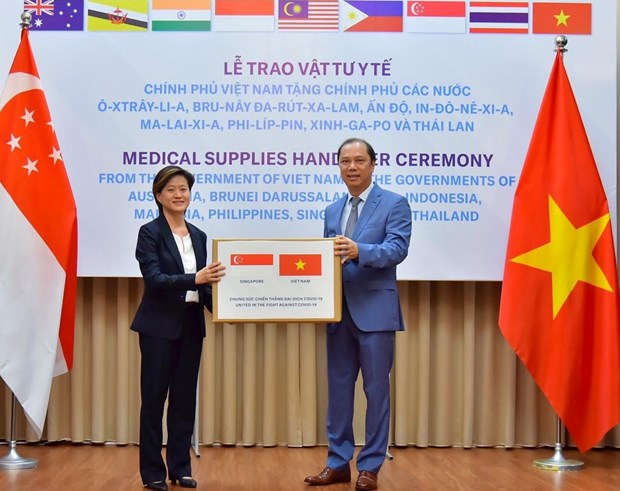
To mark Singapore's 55th National Day (August 9, 2020), Singaporean Ambassador to Vietnam Catherine Wong Siow Ping writes about Singapore's growing Strategic Partnership with Vietnam, and how both countries have worked together to overcome challenges.
To mark Singapore’s 55th National Day (August 9, 2020), Singaporean Ambassador to Vietnam Catherine Wong Siow Ping writes about Singapore’s growing Strategic Partnership with Vietnam, and how both countries have worked together to overcome challenges.
 |
| Singaporean Ambassador Catherine Wong Siow Ping (left) receives a donation of Reverse Transcription Polymerase Chain Reaction test kits from Vietnamese Deputy Foreign Minister Nguyen Quoc Dung in May. |
Singapore celebrates 55 years of independence this year. It is an important occasion that we traditionally celebrate with a big National Day Parade. However, due to the COVID-19 pandemic, parade elements will be decentralised and streamed live on television and the internet.
Indeed, the pandemic has caused major disruptions all over the world. This once-in-a-generation crisis has changed the way we live, work and play. To tackle the pandemic, Singapore imposed a “circuit breaker” from April 7 to June 1, 2020, consisting of stringent restrictions on large-scale social gatherings. Having controlled the spread of the virus over the last two months, we have started gradually opening up our economy and society. Retail stores and restaurants have re-opened, while international passengers can transit through Changi Airport. At the same time, safety remains a top priority, with safe distancing requirements and restrictions on social gatherings in place.
A key pillar of our COVID-19 strategy is taking an active and rigorous testing approach. We are increasing our testing capacity from around 8,000 tests per day currently to 40,000 tests per day by the end of the year. We are proactively testing population groups that are deemed vulnerable or have a higher risk of exposure to COVID-19, including foreign workers in dormitories, pre-school staff, and staff and residents of residential homes for seniors. While this has led to more cases being detected, it enables us to identify and ring fence new cases early, thereby preventing further spread of the virus. We are also strengthening our contact tracing capabilities by leveraging on technology. As a result, the number of new cases in the community has declined. Most importantly, we have kept the mortality rate low at less than 0.1 percent – among the lowest in the world. This reflects the high quality of Singapore’s healthcare system. Looking ahead, we are building up our vaccine manufacturing capacity by investing heavily in research and development.
Through these efforts, Singapore remains a safe hub for business, investment, and trade. We remain committed to keeping our seaports and airports open, and to continue our critical role in facilitating global trade in essential goods and services. We are also looking to progressively reopen our borders with the necessary health safeguards in place.
During this challenging period, Vietnam has been a valuable partner and friend to Singapore – a testament to the close ties built over the years. We are very grateful to the Vietnamese government agencies and private organisations that donated medical equipment to Singapore. Despite the pandemic, we are continuing to strengthen the Vietnam-Singapore Strategic Partnership. For instance, we are actively collaborating to keep markets open and supply chains connected. Agri-trade is increasing, with deepening cooperation on rice and other food products. Notwithstanding the global economic gloom, Vietnam remains an attractive market for Singapore. Singapore is Vietnam’s third largest foreign investor, with cumulative investment of more than 47 billion USD in more than 2,000 projects.
Our bilateral trade has also steadily grown to reach 22.7 billion USD in 2019. Singapore companies are keen to partner with Vietnam in new areas such as the digital consumer and lifestyle sector, high-tech manufacturing, digital start-ups, renewable energy, and sustainable urban solutions. To facilitate these growing trade and business links, Vietnam and Singapore are discussing how to reopen borders for essential business travel safely and gradually, when the time is right.
Singapore and Vietnam also cooperate extensively in ASEAN. As the Chair of ASEAN during this time of unprecedented challenges, Vietnam’s theme of “Cohesive and Responsive” is most fitting. With all ten ASEAN member states affected by COVID-19, battling the pandemic has become a key priority. Even as the pandemic has disrupted physical ASEAN meetings, Vietnam has successfully hosted key summits virtually, including the Special ASEAN and ASEAN Plus Three Summits on COVID-19 and the 36th ASEAN Summit.
These meetings produced concrete recommendations for collective action, including dealing with the pandemic, enhancing regional economic integration and ensuring supply chain connectivity. Singapore will continue our steadfast support for Vietnam’s ASEAN Chairmanship. We are confident that under Vietnam’s leadership, ASEAN will make further progress this year. In particular, amid the regional economic downturn, it is important for ASEAN to show the world that we are open for business, with a stable and integrated economy conducive for foreign investment. We therefore hope the Regional Comprehensive Economic Partnership will be signed this year. This will send a resounding message of ASEAN unity and centrality, while boosting confidence in the stability and integration of the regional economy. It will also aid ASEAN’s economic recovery from the impact of COVID-19.
As we navigate these uncharted waters, Singapore will continue to work with Vietnam to pursue further cooperation, both bilaterally and multilaterally, to accelerate our recovery from the pandemic and ultimately improve the lives of the people of both countries.
(Source: VNA)





